Bringing a German Shepherd puppy into your home is an exciting journey, filled with growth, learning, and endless affection. Ensuring your robust companion receives the best possible nutrition from day one is paramount for their long-term health, especially given their predisposition to certain skeletal issues. While commercial foods offer convenience, crafting homemade food for your German Shepherd puppy allows you to meticulously control ingredients, ensuring a balanced, fresh, and wholesome diet tailored to their unique needs.
This comprehensive guide, inspired by veterinarian-recommended principles for balanced dog nutrition, will walk you through the specifics of preparing homemade meals that support your German Shepherd puppy’s rapid development, strong bones, and vibrant health.
Understanding Your German Shepherd Puppy’s Unique Nutritional Needs
German Shepherd puppies are large breed dogs that experience rapid growth, putting specific demands on their diet. Unlike small breeds, they require controlled growth to prevent excessive strain on their developing joints, which can contribute to conditions like hip and elbow dysplasia. Therefore, their homemade food must strike a delicate balance of protein, fat, carbohydrates, vitamins, and minerals.
A key consideration is the calcium-to-phosphorus ratio. Too much calcium, or an imbalanced ratio, can be just as detrimental as too little, leading to orthopedic problems. While adult dogs can often utilize calcium from sources like crushed eggshells, growing puppies, especially large breeds, have very specific requirements that are best met under veterinary guidance. This recipe provides a solid foundation, but always consult your vet or a certified veterinary nutritionist to ensure it’s perfectly balanced for your individual GSD puppy’s stage of growth and health.
Why Choose Homemade Food for Your Growing GSD Puppy?
Opting for homemade food for your German Shepherd puppy offers numerous advantages, allowing you to proactively manage their health and well-being:
- Complete Ingredient Control: You know exactly what goes into their bowl, avoiding artificial preservatives, fillers, and common allergens that can sometimes be found in commercial kibble.
- Optimal Freshness and Nutrient Density: Freshly prepared meals retain more vital nutrients compared to highly processed alternatives.
- Addressing Specific Sensitivities: If your GSD puppy has allergies or sensitivities, you can easily adapt ingredients to avoid triggers.
- Enhanced Palatability: Many dogs, especially discerning puppies, find homemade meals far more appealing than dry kibble, ensuring they get the nutrition they need.
- Healthy Growth Support: With careful formulation, homemade diets can help support controlled, steady growth crucial for large breeds, potentially mitigating the risk of skeletal issues. This approach complements a healthy lifestyle, much like exploring options for optimal wilderness dog food for active adult canines.
Essential Ingredients for Your German Shepherd Puppy’s Homemade Diet
Creating a balanced homemade diet for your German Shepherd puppy involves a mix of lean protein, healthy fats, complex carbohydrates, and nutrient-rich vegetables. Here are the core components:
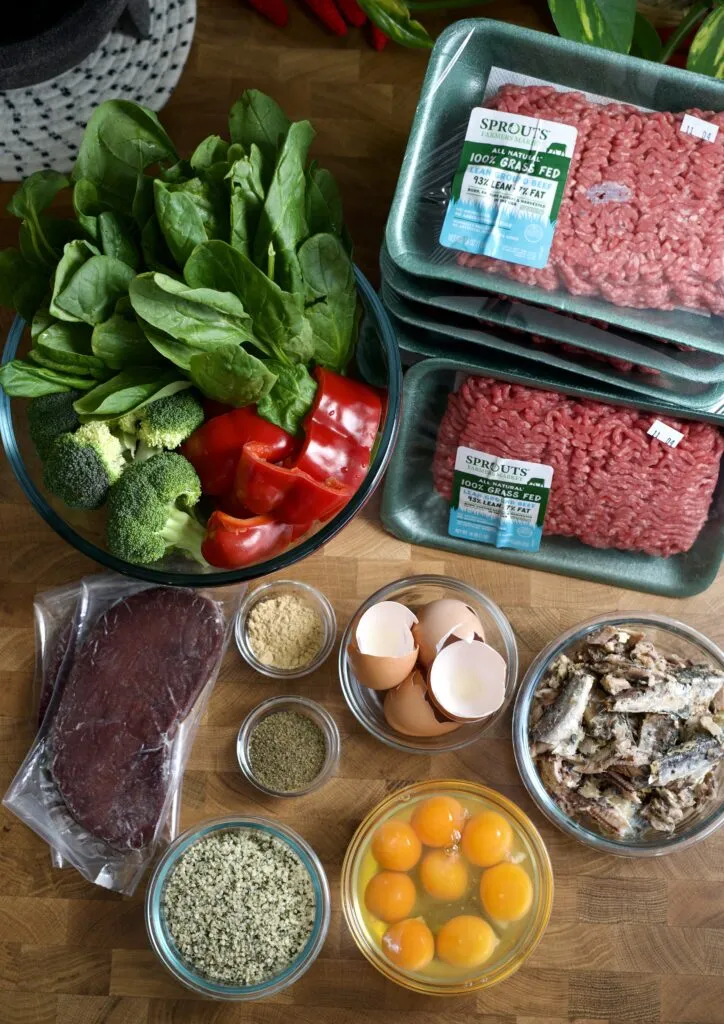 A dog eagerly looking at a bowl of homemade food, ready to eat.
A dog eagerly looking at a bowl of homemade food, ready to eat.
- Lean Ground Meat (Beef, Turkey, or Chicken): This is the primary protein source, vital for muscle development. For puppies, ensuring it’s very lean is important. If using ground turkey or chicken, you might need to adjust other ingredients slightly to compensate for differences in iron and zinc content.
- Hempseed (or Hempseed Oil): An excellent source of essential omega-3 and omega-6 fatty acids, crucial for brain development, coat health, and reducing inflammation. Always be cautious when cooking with hempseed oil, as high heat can alter its palatability for dogs.
- Sardines (in water): A powerhouse for Vitamin D and E, and beneficial omega fatty acids. Always choose sardines packed in water, not oil, and drain them well.
- Ground Ginger: Rich in manganese, which supports the healthy development of connective tissues, ligaments, tendons, and joints – all critical for a rapidly growing large breed puppy.
- Kelp Powder: A fantastic source of iodine and trace minerals, contributing to thyroid health, skin, and coat quality.
- Eggs: Provide folic acid and Vitamin B12. However, egg shells are NOT recommended as the sole calcium source for puppies, especially large breeds like German Shepherds. Their calcium needs are very specific for controlled growth and should be discussed with a vet for appropriate supplementation if needed.
- Beef Liver: A nutrient-dense organ meat, supplying vital copper, zinc, and iron. Ensure it’s sourced from a reputable provider.
- Broccoli, Red Bell Pepper, and Spinach: These vegetables offer essential antioxidants, phytonutrients, enzymes, and dietary fiber. For puppies, ensure all vegetables are finely pureed or chopped to aid digestion. Note: While spinach is fine for most healthy dogs in small amounts, discuss with your vet if your puppy has any kidney concerns.
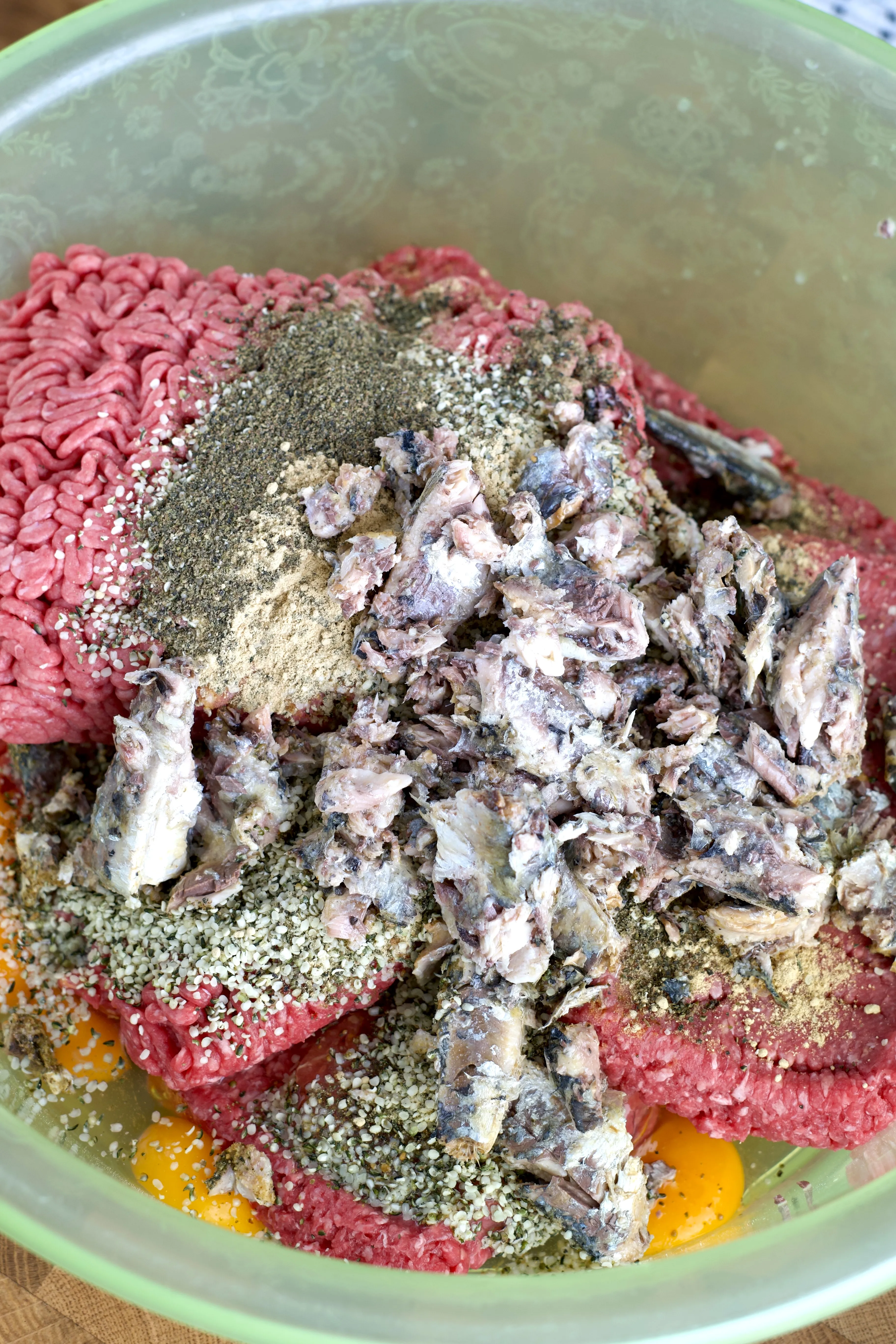 Various fresh ingredients for homemade dog food, including vegetables, eggs, and sardines, arranged on a counter.
Various fresh ingredients for homemade dog food, including vegetables, eggs, and sardines, arranged on a counter.
Preparing Your German Shepherd Puppy’s Homemade Meals
This recipe is designed for ease of preparation, allowing you to make large batches for convenient storage. Remember, gentle cooking is key to preserving nutrient integrity, particularly for sensitive ingredients like hempseed oil.
- Combine Meat and Key Supplements: In a large bowl, mix the lean ground beef (or poultry), eggs, kelp powder, ground ginger, hempseed (or oil), drained sardines, and optionally, a small amount of pumpkin puree for digestive health. Ensure the sardines are well broken up for even distribution.
- Process Vegetables and Organ Meat: In a food processor, blend the broccoli, red bell pepper, and beef liver until finely chopped. This ensures optimal digestion and nutrient absorption for your puppy. You might need to do this in batches.
 Blended vegetables, eggshells, and beef liver in a food processor, ready to be mixed.
Blended vegetables, eggshells, and beef liver in a food processor, ready to be mixed. - Mix Everything Together: Add the processed vegetable and liver mixture to the ground meat mixture. Mix thoroughly until all ingredients are uniformly combined.
 Mixing blended vegetables and liver with ground beef in a large bowl to create homemade dog food.
Mixing blended vegetables and liver with ground beef in a large bowl to create homemade dog food. - Gentle Cooking (Optional but Recommended for Puppies): While some adult dogs thrive on raw diets, for puppies, especially those new to homemade food, gentle cooking can enhance digestibility and reduce potential risks. Cook the food without oil in a nonstick pan over low heat until just done. Avoid searing the meat over high heat, as this can degrade nutrients and make certain ingredients, like hempseed oil, unpalatable. You can form patties, large chunks, or keep it minced. If using a stainless steel pan, ensure it’s properly preheated before adding food to prevent sticking.
 A stainless steel pan on the stove with gently cooked ground meat, prepared for dog food.
A stainless steel pan on the stove with gently cooked ground meat, prepared for dog food.
Portioning and Storing for Optimal Puppy Nutrition
Proper portioning and storage are essential for safety and convenience, especially when feeding a growing German Shepherd puppy.
- Calculate Portions: The amount of food your GSD puppy needs will vary significantly based on their age, weight, activity level, and growth rate. It is crucial to consult your veterinarian or a certified veterinary nutritionist for precise feeding guidelines. Overfeeding a large breed puppy can lead to rapid growth and skeletal problems. Generally, puppies may eat 2-4% of their body weight daily, but this is a rough estimate. Your vet will provide the most accurate advice.
- Storage: Once prepared, portion the food into daily servings. Homemade food can be stored in the refrigerator for up to 3-4 days. For longer storage, freeze individual portions in airtight containers or reusable freezer bags. Frozen food can last for several weeks. Thaw overnight in the refrigerator as needed.
 Portioning out homemade dog food into reusable freezer bags for convenient storage.
Portioning out homemade dog food into reusable freezer bags for convenient storage.
Important Considerations for German Shepherd Puppy Diets
- Veterinary Consultation is Non-Negotiable: For large breed puppies like German Shepherds, a veterinarian’s guidance on nutrition is paramount. They can help you fine-tune recipes to ensure correct calcium-to-phosphorus ratios and overall nutrient balance, which are critical for preventing developmental orthopedic diseases.
- Avoid Bones for Puppies (Unless Vet Approved and Raw): While adult dogs might enjoy certain raw bones, feeding bones to puppies, especially cooked ones, carries significant risks of choking, broken teeth, or internal injury. If considering raw bones, discuss extensively with your vet, referencing resources like what bones are good for dogs to eat for informed decisions.
- Introduce New Foods Gradually: When transitioning your puppy to a homemade diet or introducing new ingredients, do so slowly over several days to avoid digestive upset.
- Observe Your Puppy: Monitor your German Shepherd puppy’s weight, energy levels, stool quality, and overall health. Any changes should prompt a discussion with your vet.
Conclusion
Feeding your German Shepherd puppy a homemade diet can be one of the most rewarding ways to ensure they receive optimal nutrition for a healthy, vibrant life. While it requires dedication and careful planning, the control and quality you provide can significantly contribute to their strong development and well-being. Always remember that for large breed puppies with their unique growth requirements, a partnership with your veterinarian is crucial to tailor this recipe and any homemade diet to meet their precise needs at every stage of their rapid development. Continue to explore ways to enhance your dog’s health with ingredients like spirulina for dogs, which offers various nutritional benefits.
For more comprehensive advice on canine nutrition and care, consult reputable veterinary resources and ensure your German Shepherd puppy receives regular check-ups.

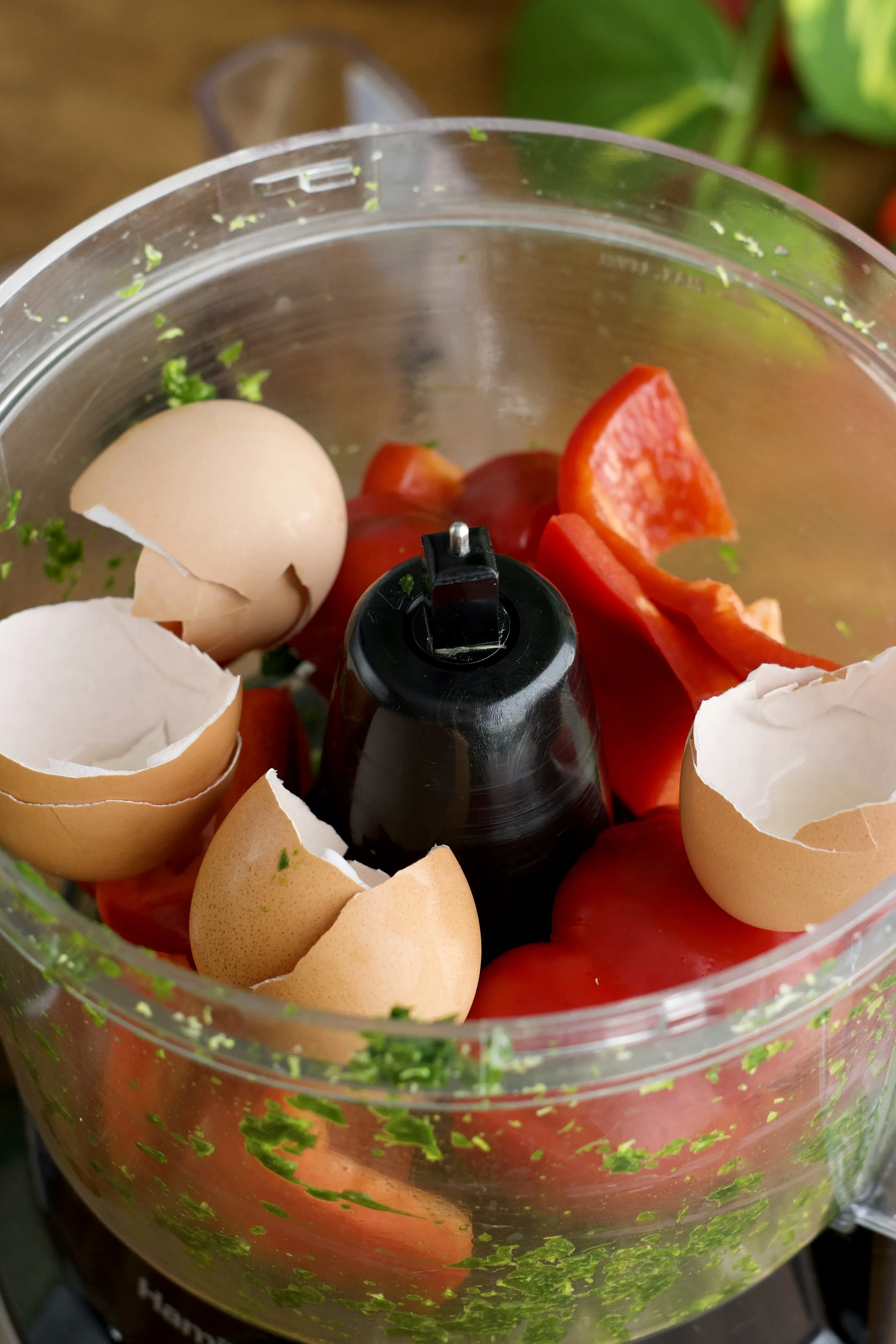 Blended vegetables, eggshells, and beef liver in a food processor, ready to be mixed.
Blended vegetables, eggshells, and beef liver in a food processor, ready to be mixed.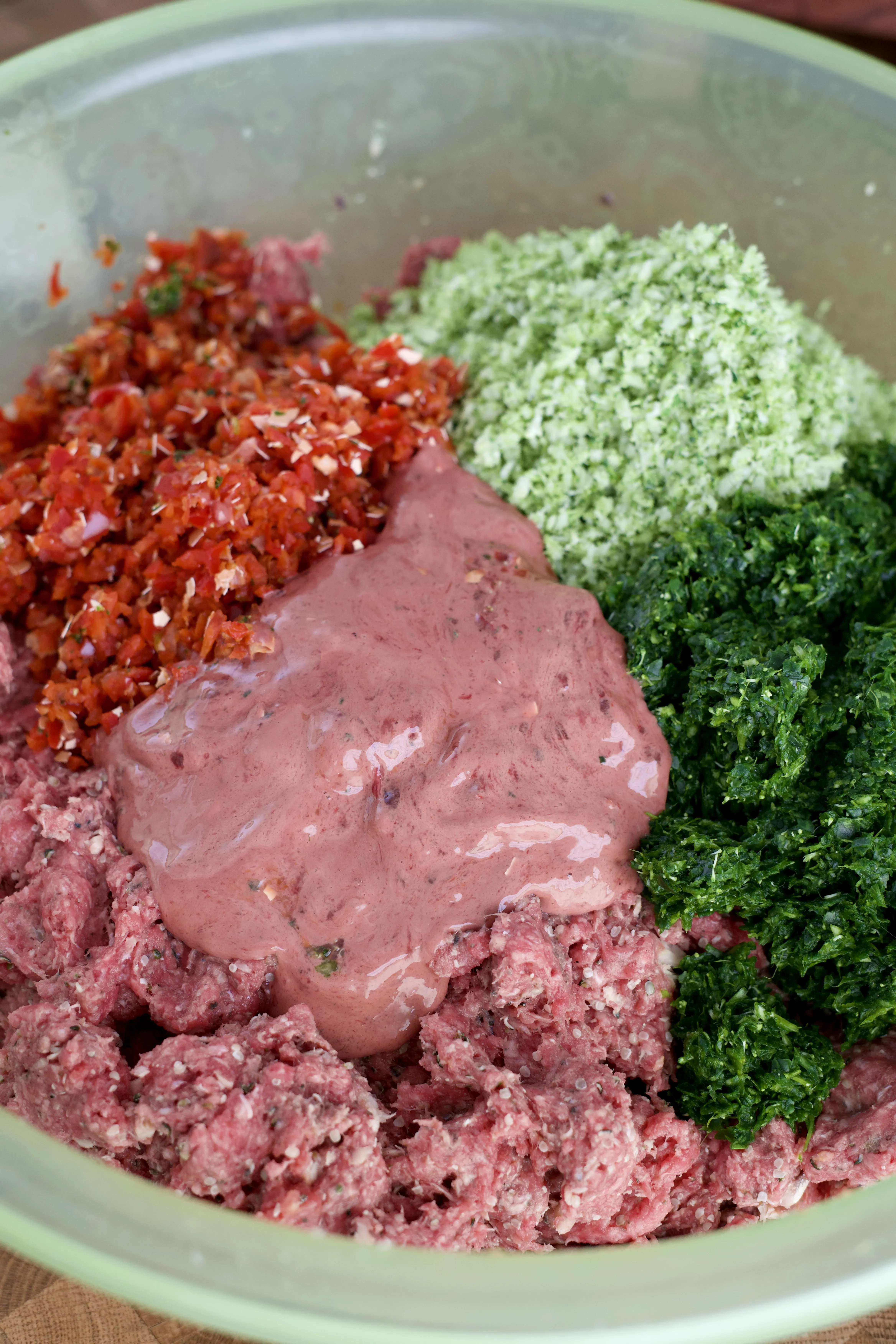 Mixing blended vegetables and liver with ground beef in a large bowl to create homemade dog food.
Mixing blended vegetables and liver with ground beef in a large bowl to create homemade dog food.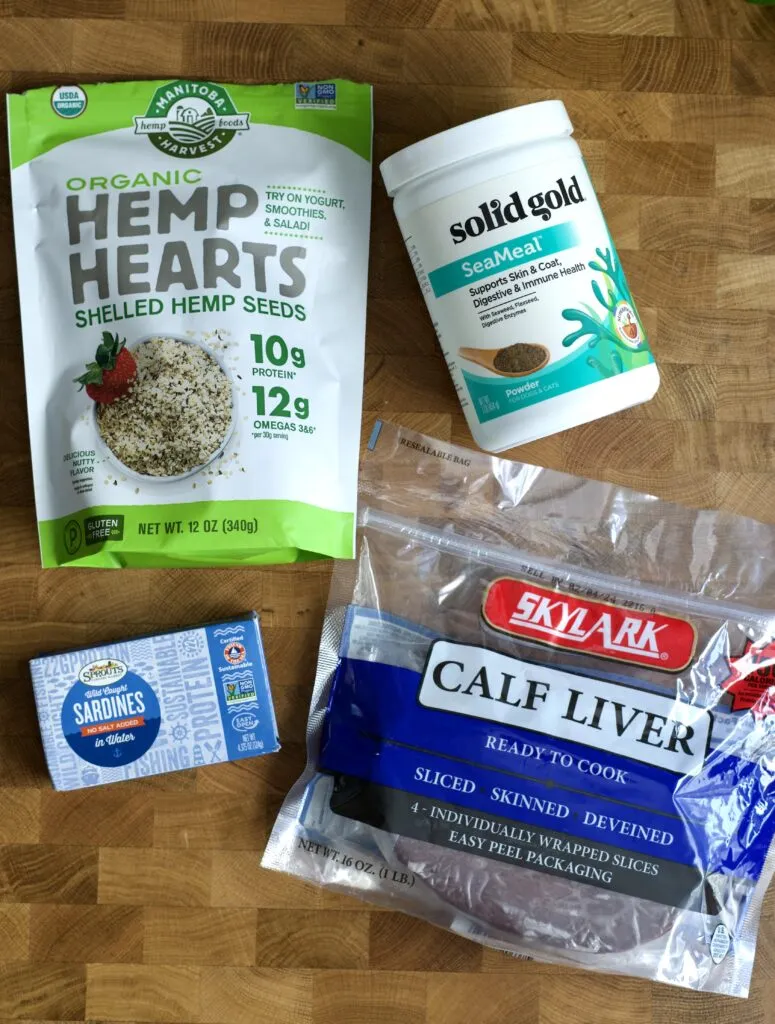 A stainless steel pan on the stove with gently cooked ground meat, prepared for dog food.
A stainless steel pan on the stove with gently cooked ground meat, prepared for dog food.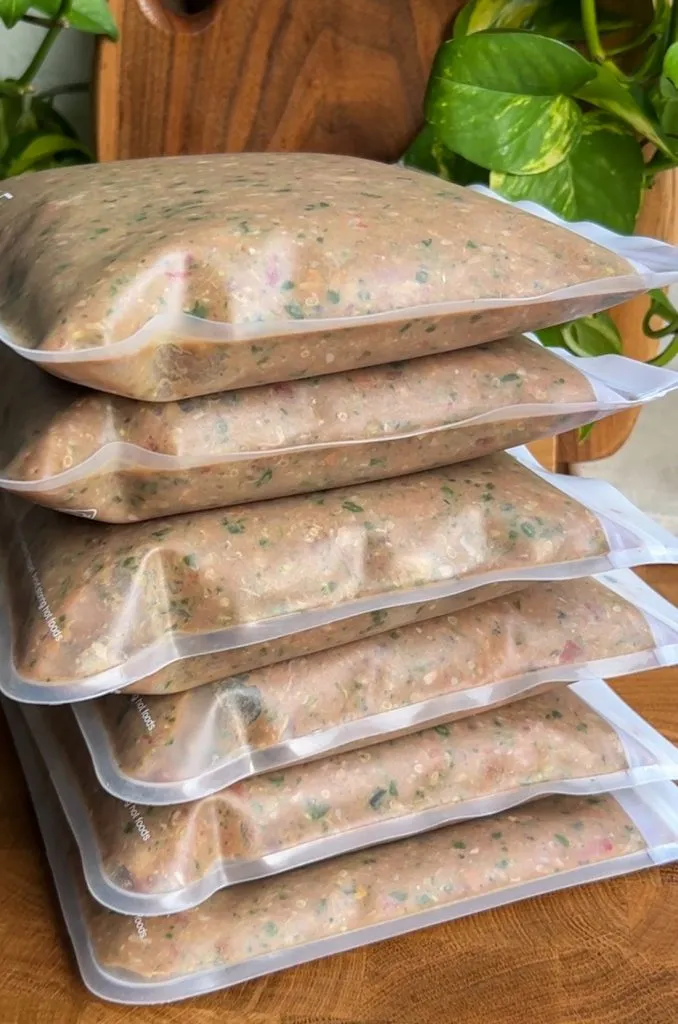 Portioning out homemade dog food into reusable freezer bags for convenient storage.
Portioning out homemade dog food into reusable freezer bags for convenient storage.